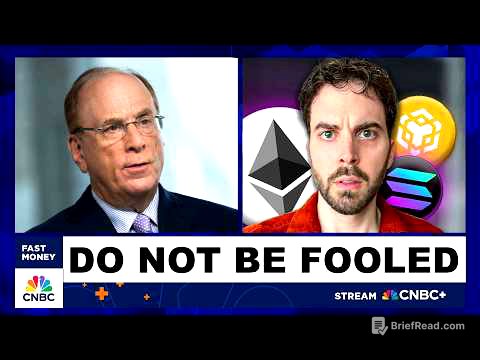TLDR;
This video explores the concept of the programmed human mind and how it affects our lives. It discusses how negative thoughts and beliefs, often instilled from a young age, become deeply embedded in the subconscious mind, influencing our actions, health, and overall well-being. The video emphasizes the importance of recognizing this conditioning and actively reprogramming the mind through practices like meditation and positive affirmations. It highlights the power within each individual to overcome negativity, unlock their potential, and live a fulfilling life by understanding and harnessing the power of their subconscious mind.
- The subconscious mind is a powerful tool that can be used for good or evil.
- It is important to reprogram the subconscious mind with positive thoughts and beliefs.
- Meditation and visualization can be used to reprogram the subconscious mind.
Introduction: The Programmed Mind [0:00]
The speaker introduces the topic of how the human mind is programmed, referencing a religious program where a speaker criticized psychology for suggesting people are gods, attributing this idea to Satan. The speaker contrasts this with biblical passages where Jesus Christ states, "I said, 'You are gods.'" He argues that traditional religious systems protect themselves by discouraging people from realizing their own divine potential, keeping them dependent on the system.
Biblical Perspective: "You Are Gods" [2:41]
The speaker references Psalm 82, where God says, "I have said you are gods; you are all children of the Most High," but also notes that they will die like men. He poses the question of how to avoid this fate, pointing to verse eight, which calls for judging the Earth and inheriting all nations. This sets the stage for discussing how our minds are conditioned and how this conditioning affects our lives.
Conditioning Example: The "Spot" Experiment [5:07]
To illustrate conditioning, the speaker conducts a word association experiment with a woman named Gina. After repeatedly spelling "spot," she is asked what to do at a green light, and she initially hesitates before answering "go," demonstrating how easily the mind can be conditioned to respond in a certain way. The speaker emphasizes that breaking free from this conditioning is possible and necessary for personal growth.
The Conscious Mind and Its Limitations [6:45]
The speaker asserts that the conscious mind is the only entity that remembers its beginning and anticipates its end. He uses the example of a troubled young man who died in a car accident to illustrate how negative conditioning can dictate a person's reactions and life path. He questions the purpose of life and the pursuit of security in an uncertain world, urging listeners to consider why they are the way they are.
Habits and the Subconscious Mind [8:27]
The speaker explains that our thoughts are driven by habits, which are thoughts deeply ingrained in the subconscious. These negative thoughts can fester and eventually manifest as physical ailments like tumors or diseases. He criticizes the unthinking acceptance of tradition, where reasons are often dismissed with "because I said so."
Tradition vs. Inner Power [9:54]
Referencing Matthew 15, the speaker highlights Jesus' contempt for tradition, religion, and the established system. He emphasizes that within each person lies the power to overcome negativity and disease, but traditional thought patterns keep people locked in a "cellar" with a "deadbolt lock."
The Power Within: Good and Evil [11:31]
The speaker stresses that the same power that brings bad fortune can also bring good, depending on how it's used. He references Isaiah 45:7, where God states, "I form the light and create darkness, I make peace and create evil; I, the Lord, do all these things." He uses the analogy of atomic energy, which can both power homes and destroy lives, to illustrate that the power itself is neutral; its effect depends on the user.
Unlocking the Subconscious Mind [15:29]
The speaker explains that our conceptions of ourselves are locked in the subconscious mind, and the only way to change is to find a "key" to unlock that door. He recommends reading "The Undiscovered Self" by Carl Jung to understand the subconscious mind. He questions where to find the key to unlock all the wrong things that parents, church, government, and friends have put in there.
The Key of Knowledge: Entering Within [16:45]
Referencing Luke 11:52, the speaker quotes Jesus saying, "Woe unto you lawyers! For you have taken away the key of knowledge. You did not enter in yourselves, and those who were entering in you hindered." He interprets this to mean that the key to unlocking the subconscious lies in entering within oneself.
The Subconscious Mind: A Constant Presence [18:01]
The speaker emphasizes that the subconscious mind never sleeps, never forgets, and remembers everything. He explains how smells or other sensory experiences can instantly transport us back to past memories stored in the subconscious. He asserts that everything we've ever heard, learned, or been told is accepted as fact and stored in the subconscious mind, making it the most powerful instrument in the universe.
The Conscious and Subconscious: A Master-Servant Relationship [19:01]
The speaker highlights that the conscious mind is only 10% of our mental capacity, yet the subconscious mind, the greatest power in the universe, obeys everything it is told by this small conscious mind. He explains that if we constantly tell ourselves we are sick, the subconscious will manifest that sickness.
Reprogramming the Mind [22:42]
Referencing Romans 12:2, the speaker urges listeners to "be transformed by the renewing of your mind." He likens the conscious mind to a computer that needs to be reprogrammed with a new "floppy disc." He emphasizes that the problems in our lives are not caused by external factors but by the information stored within our minds.
The Subconscious as a Dictator [24:01]
The speaker explains that the subconscious mind dictates our actions and feelings based on the "orders" programmed into it. He points out that unhappiness often leads to making others unhappy.
Personal Anecdote: The Disturbance in the Mountains [25:18]
The speaker shares a personal story about being disturbed by a loud argument while vacationing in the mountains. He explains that the incident triggered memories of his tumultuous childhood, illustrating how the subconscious mind can transport us back to past experiences.
The Subconscious and Anti-Social Behavior [30:04]
The speaker discusses how negative experiences, especially in childhood, can be deeply embedded in the subconscious and lead to anti-social behavior later in life. He uses the example of an unwanted child who may grow up to be a killer or rapist, not because they are inherently bad, but because of the hurt and fear programmed into their subconscious.
The Importance of Reprogramming [33:44]
The speaker emphasizes that simply "acting out" anger is not enough to change deeply ingrained patterns. He stresses the need for metaphysical, spiritual work to reprogram the subconscious mind, using the "key" of Jesus to unlock the door and allow the higher Divine mind to push out the negativity.
The Cycle of Failure [34:29]
The speaker explains that many people are programmed to fail, with deep-seated beliefs of inadequacy instilled from a young age. He argues that until this programming is removed from the subconscious mind, success will remain elusive.
Seeking the Kingdom Within [35:55]
The speaker reiterates the importance of seeking the kingdom of God within, as Jesus taught, to flush away negativity and allow new, positive beliefs to take root. He encourages listeners to replace negative self-talk with affirmations like "I am God" to unlock their potential.
The Power of Belief [37:09]
The speaker discusses how sickness, loneliness, and other negative experiences are often coded in the subconscious mind. He emphasizes the need to rise above this programming and understand that the subconscious is a powerful creator that will manifest exactly what it is programmed to create.
Removing Bad Programs [38:52]
The speaker encourages listeners to remove bad programs from the subconscious mind and allow negative programming to get out. He urges them to reject the system, embrace the teachings of Christ, and open themselves to reprogramming.
The Culprit: Fear [39:38]
The speaker identifies fear as the chief culprit in this whole process. He notes that religious leaders often avoid discussing the mind, even warning against exploring it, because they fear the negativity programmed into people through religion.
Loving Yourself [40:34]
The speaker questions where one can go if they are afraid of themselves and cannot love themselves. He contrasts this with the religious speaker who criticized "humanism" and the "worship of self," arguing that it's essential to recognize one's own worth and potential.
Jesus' Message: The Greatness Within You [41:28]
The speaker emphasizes that Jesus Christ came to show the greatness within each individual, stating, "You are the light of the world." He encourages listeners to go directly to the source of power within themselves, rather than relying on external figures or systems.
Meditation and Reprogramming [42:20]
The speaker highlights the importance of meditation for reprogramming the mind, turning away from external thoughts and listening to the inner voice. He encourages listeners to use various meditation techniques to connect with their inner selves.
The Universal Mind [43:32]
The speaker asserts that the creative power of the universe is within each person, and every creation is the result of a conscious mind not prevented by negative subconscious programming. He emphasizes that everyone has the same potential, but some have been fortunate enough to avoid negative programming.
Conviction and Experience [44:48]
The speaker concludes by stating that our experience in life is exactly what we are convinced of. He emphasizes that negative programming can be changed, and by doing so, we can break free from limitations and live a fulfilling life.
Taking Control of Your Vineyard [46:06]
The speaker encourages listeners to become caretakers of their own "vineyard," planting the "tree of life" and transforming barren landscapes into springs of water. He urges them to leave with the conviction that they can change and make a difference, and to commit to practices like meditation to unlock their potential.




![Unlock Your Spine! Complete Stretching Routine [Follow Along]](https://wm-img.halpindev.com/p-briefread_c-10_b-10/urlb/aHR0cDovL2ltZy55b3V0dWJlLmNvbS92aS9HTUt0OWNEUFZPOC9ocWRlZmF1bHQuanBn.jpg)




